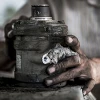71 careers found.
Electricians install, maintain, repair, test and commission electrical and electronic equipment and systems for industrial, commercial and domestic purposes. Electricians may also work on electrical transmission and distribution equipment.
Employers & associations:
Electrical Group Training (EGT)
Engine reconditioners set up and operate machinery to restore and recondition the machined surfaces of engines and related vehicle components.
Food technologists develop and improve existing food products and set standards for producing, packaging and marketing food. They use chemistry, microbiology, engineering and other scientific methods to study the process of food deterioration. They may specialise in fields such as meat, dairy, seafood, cereal products, confectionery, snack foods, beverages and minimally processed fresh produce.
Geologists study the nature, composition and structure of the earth to locate materials and minerals, and to increase scientific knowledge. They also advise on the extraction of minerals, as well as on environmental protection, the rehabilitation of land after mining and on civil engineering projects.
Geophysicists study the structure and composition of zones below the surface of the earth by taking measurements using seismic, gravity, magnetic and electrical data collection methods. The two main divisions of geophysics are exploration geophysics, which deals with the search for Earth's resources, and global geophysics, which uses the same techniques to study Earth as a whole and study earthquakes, magnetic fields and other phenomena. Geophysicists often specialise in areas such as seismology and seismic interpretation, borehole geophysics, mineral exploration, engineering geophysics, environmental or groundwater geophysics, or computer processing and software development.
Heavy vehicle motor mechanics repair, maintain and test heavy vehicles, other engines and related mechanical components.
Laboratory workers assist scientists, engineers, technical officers and other laboratory staff by collecting and preparing samples, carrying out experiments, making measurements with scientific equipment, recording results and presenting them for critical analysis.
Marine surveyors carry out inspections of passenger and cargo ships, commercial charter craft, fishing vessels, recreational craft and yachts.
Metal surface finishers work in metal fabrication and engineering production operations. They finish metal products by cleaning, polishing, filing or bathing them in acid solutions. They also apply protective and decorative coatings.
Metal trades assistants assist metal engineering tradespeople by performing routine tasks.
Metallurgical technicians test materials as part of mineral processing and metal refining, or for research purposes, and provide technical support to metallurgical engineers.
Model makers construct full-size and scale models of landscape, engineering, architectural, automotive and other industrial designs. They work from scale drawings, plans, photographs and lists of figures or specifications requiring conversion to three-dimensional form. These models help designers to see how a project, such as a building or a car, will look or work before it is completed. Some model makers, such as automotive clay modellers, may specialise in high-quality artistic work, while others may concentrate on technically accurate models.
Naval architects design and oversee the construction, survey and repair of marine craft and floating structures, including naval craft, passenger and cargo ships, submarines, high-speed ferries and catamarans, tugs, boats, yachts and oil rigs.
Non-destructive testing technicians examine and test the functionality and performance of an object or material in a way that will not affect its usefulness.
Physical science technical officers support scientists in the physical sciences. They perform laboratory tests on solids, liquids and gases, analyse test data and carry out a range of technical functions. Work in physical science areas such as physics, chemistry, biotechnology and engineering is usually undertaken in support of other scientists.









